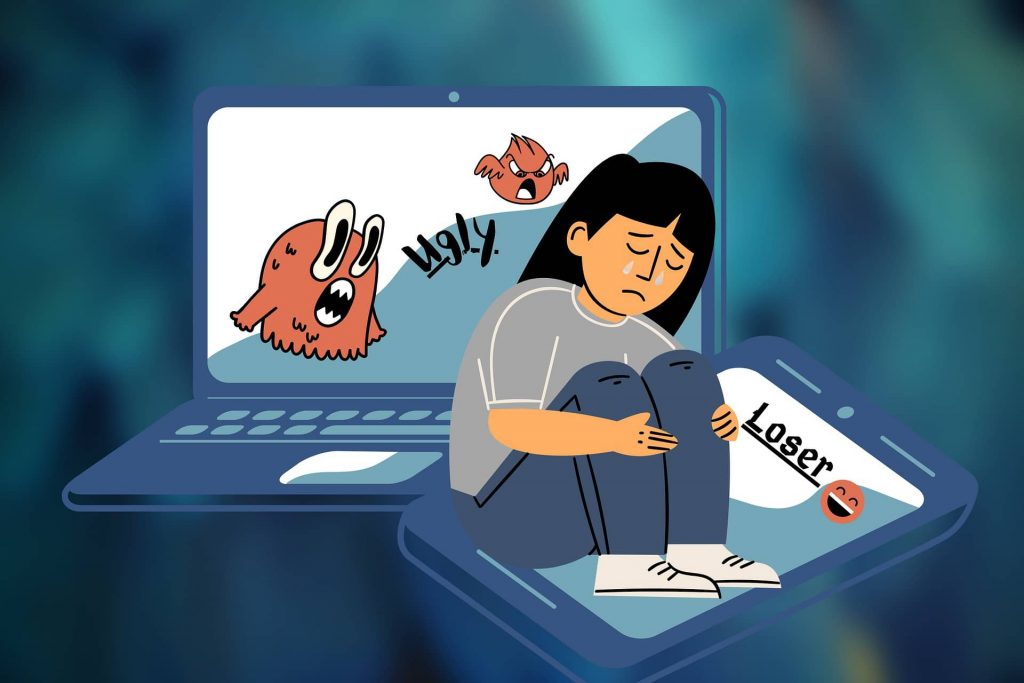Preventing Cyberbullying in Schools: Expert Tips and Strategies
2 June 2023 | 6 mins read
- Staff resources
Cyberbullying is a growing concern in schools across the globe. With the rise of technology and social media, students are more vulnerable to online harassment and abuse than ever before.

Cyberbullying can take many forms, from sending hurtful messages and posting embarrassing photos to spreading rumors and making threats. It can have serious consequences for the mental health and well-being of victims, leading to anxiety, depression, and even suicide.
Preventing cyberbullying in schools requires a multi-faceted approach. It involves educating students, teachers, and parents about the dangers of cyberbullying and how to recognize and report it. It also requires schools to have clear policies in place for dealing with cyberbullying incidents and providing support to victims.
By working together, schools can create a safe and supportive environment for all students, free from the fear of cyberbullying.
Understanding Cyberbullying

What is Cyberbullying?
Cyberbullying, also known as “flaming”, is a form of bullying that takes place online or through electronic devices such as phones, computers, or tablets. It can involve sending hurtful or threatening messages, spreading rumors, posting embarrassing photos or videos, or impersonating someone online.
Cyberbullying can happen to anyone, and it can be difficult to escape since electronic devices are so pervasive in our lives.
Related read: Why are girls more likely than boys to be victims of cyberbullying?
Types of Cyberbullying
There are many different types of cyberbullying, including:
- Harassment: Repeatedly sending threatening or hurtful messages to someone.
- Impersonation: Pretending to be someone else online in order to harm their reputation or spread false information.
- Gossip: Spreading rumors or private information about someone online.
- Exclusion: Leaving someone out of online conversations or activities intentionally.
- Fraping: Hacking into someone’s social media account and posting embarrassing or hurtful content.
Negative Effects of Cyberbullying
Cyberbullying can have serious consequences for victims, including depression, anxiety, stress, and suicidal thoughts.
Victims may also experience physical symptoms such as headaches or stomachaches, and their grades or motivation may suffer. Cyberbullying can also harm a victim’s self-esteem and make them feel isolated or overwhelmed.
In addition to the harm it causes to victims, cyberbullying is also harmful to the bullies themselves. It can lead to behavioral changes, drug or alcohol use, and other negative outcomes. Cyberbullies may also face legal consequences for their actions.
Warning Signs
It is important for parents, teachers, and friends to be aware of the warning signs of cyberbullying. These can include changes in sleeping or eating habits, skipping school, or avoiding social situations. Victims may also become nervous or anxious when using electronic devices, or they may become more isolated from friends and family.
To prevent cyberbullying, it is important for everyone to take responsibility for their own behavior online. This includes respecting others’ privacy settings, not impersonating someone else online, and not sending threatening or hurtful messages.
By working together, we can create a safer and more respectful online environment for everyone.
Preventing Cyberbullying
Cyberbullying is a growing concern in schools, and it is important to take steps to prevent it. Here are some ways that schools can work to prevent cyberbullying:
Educating Students
One of the most important ways to prevent cyberbullying is to educate students about it. Schools should teach students about the different forms of cyberbullying, how to recognize it, and what to do if they or someone they know is being cyberbullied. This education should start early, as young students are increasingly using digital media. Educators should also teach students about the importance of positive comments and mutual respect online.
Creating School Policies
Districts and schools should adopt policies to help prevent cyberbullying, such as school climate initiatives and support for digital citizenship and positive character development. These policies should clearly outline what is and is not acceptable behavior online, and what the consequences will be for cyberbullying. School administrators should also work with social media companies to ensure that their platforms are safe for students.
Encouraging Positive Behavior
Schools should encourage positive behavior both online and offline. This can include promoting positive comments and mutual respect online, and discouraging negative comments and cyberbullying. Schools should also teach students how to protect their personal information online, and encourage them to use privacy settings on social media platforms.
Teaching Responsible Digital Citizenship
Finally, schools should teach responsible digital citizenship. This includes teaching students about the importance of being responsible and respectful online, and about the potential consequences of their actions online. Schools should also provide resources for students who are being cyberbullied, and for parents who are concerned about their children’s safety online.
Preventing cyberbullying is a complex issue, but by educating students, creating school policies, encouraging positive behavior, and teaching responsible digital citizenship, schools can take important steps to prevent it.
Identifying and Responding to Cyberbullying

Cyberbullying is a growing concern in schools and can have negative effects on the mental health and well-being of victims.
It is important for parents, teachers, and students to understand the warning signs of cyberbullying, how to report it, support victims, and confront cyberbullies.
Warning Signs of Cyberbullying
Cyberbullying can take many forms, including abusive messages, flaming, trolling, cyberstalking, outing, catfishing, trickery, denigration, and more. It can occur through social media platforms like Instagram, Twitter, and Facebook, as well as through text messaging, emails, videos, and pictures.
Some warning signs that a student may be experiencing cyberbullying include anxiety, self-harm, negative effects on their mental health, and changes in behavior. Students may also become withdrawn or avoid social situations, or suddenly stop using digital technologies.
Reporting Cyberbullying
It is important for students to know how to report cyberbullying when they experience it or witness it happening to someone else. Schools should have clear policies in place for reporting cyberbullying, and students should be encouraged to speak up if they see something happening.
Social media platforms also have reporting tools that can be used to report cyberbullying. It is important for students to know how to use these tools and to report any abusive behavior they see online.
Supporting Victims
Victims of cyberbullying need support from their peers, parents, and teachers. It is important to let victims know that they are not alone and that there are resources available to help them.
Parents and teachers should also be aware of the negative effects that cyberbullying can have on mental health and should be prepared to provide support and resources to students who are struggling.
Confronting Cyberbullies
Confronting cyberbullies can be challenging, but it is important to hold them accountable for their actions. Students should be taught to respect others online and to understand the impact that their words and actions can have on others.
Teachers and parents can also work together to educate students about the responsibility they have to be respectful and kind to others online and in person.
In conclusion, identifying and responding to cyberbullying is an important part of creating a safe and supportive learning environment for students. By understanding the warning signs of cyberbullying, reporting it when it occurs, supporting victims, and confronting cyberbullies, we can work to prevent cyberbullying in schools and promote respect and kindness online and in person.
Getting Professional Support
When it comes to dealing with cyberbullying, it’s important to seek professional support if necessary. There are various types of professional support available to students who are victims of cyberbullying or who are struggling with the effects of cyberbullying. Here are a few options:
Mental Health Professional Services
Mental health professionals, such as psychologists or therapists, can provide students with the support and guidance they need to cope with the psychological effects of cyberbullying. These professionals can help students develop coping strategies, manage anxiety and depression, and work through any underlying issues that may contribute to cyberbullying. They can also help students learn how to communicate effectively with their peers and develop healthy relationships.
School Counselors
School counselors can be a great resource for students who are dealing with cyberbullying. They can provide a safe and supportive environment for students to talk about their experiences and feelings. They can also help students develop strategies to deal with cyberbullying, such as avoiding certain social media platforms or blocking certain users. Additionally, school counselors can work with teachers and administrators to create a school-wide culture of respect and kindness.
Parents and Guardians
Parents and guardians can play a critical role in supporting students who are dealing with cyberbullying. They can provide emotional support, monitor their child’s online activity, and work with the school to address any incidents of cyberbullying. They can also help their child develop healthy coping strategies and encourage them to seek professional support if necessary.
Law Enforcement
In some cases, cyberbullying may constitute a criminal offense, such as harassment or stalking. Law enforcement can provide support and guidance to students who are dealing with cyberbullying and can take action against the perpetrator if necessary. It’s important for students to know that they have the right to report incidents of cyberbullying to law enforcement and that they will be taken seriously.
Overall, seeking professional support is a critical step in addressing cyberbullying. Whether it’s through mental health professional services, school counselors, parents and guardians, or law enforcement, there are resources available to help students cope with the effects of cyberbullying and develop healthy strategies for dealing with it.





